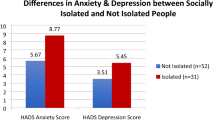Abstract
This paper presents the results of an exploratory study of the relationship between two conceptualizations of social support and the experience of stress, frustrations and use of leisure time. A correlational study was conducted with over 200 clients of community support services in a large mid-western state. For these mental health consumers, no meaningful relationship was found between social support variables and the criterion variables. The long term mentally ill were found to have small social networks. The authors argue that reducing loneliness by itself is a valuable outcome of service for this population.
Similar content being viewed by others
References
Antonucci, T., & Beals, J. Attachment in the aging process: A lifespan framework. Paper presented at the meeting of the Gerontological Society of America, San Diego, November, 1980.
Antonucci, T., & Depner, C. “Social support and informal helping relationships” (in)Basic Processes in Helping Relationships, ed. by Wills, T.A., New York: Academic Press, 1982, 233–252.
Barrera, M. “Distinctions between social support concepts, measures and models.”American Journal of Community Psychology, 1986,14(4), 415–445.
Bigelow, D., Gareau, M., & Young, D..Inter-rater reliability of a quality of life interview for chronically mentally ill people (Contract No. 278-79-0053). Salem, Oregon: Oregon State Mental Health Department, June, 1982.
Depner, C., and Ingersoll, B. “Employment status and social support: The experience of the mature woman” (in)Woman's Retirement: Policy Implications of Recent Research, ed. by Sinovacz, M. Beverly Hills California: Sage Publishers, 1982, 61–76.
Ewalt, P., & Honeyfield, R. “Needs of persons in long term care.”Social Work, 1981,26(3), 223–231.
Faloon, I., & Liberman, R. “Interactions between drug and psychosocial therapy in schizophrenia.”New Directions in Drug Treatment for Schizophrenia, ed. by Carpenter, W., and Schooler, N. Rockville, Md.: U.S. Department of Health and Human Services, National Institute of Mental Health, 1983.
Faris, R., & Dunham, W.,Mental Disorders in Urban Areas. Chicago: University of Chicago Press, 1939.
Fiore, J., Copple, D., Becker, J., and Cox, G. “Social support a multifaceted concept: Examination of important dimensions for adjustment.”American Journal of Community Psychology, 1986,14(1), 93–111.
Hammer, M., Makiesky-Barrow, S., & Gutwirth, L. “Social networks and schizophrenia.”Schizophrenia Bulletin, 1978,4(4), 522–543.
Jones, W.H., Freemon, J.E., & Goswick, R.A. “The persistence of loneliness: Self and other determinants.”Journal of Personality, 1981,49(1), March, 1981.
Kahn, R.L., Antonucci, T., & Depner, C. “Support networks among new teachers.” Ann Arbor: Survey Research Center, University of Michigan, 1979.
Leavy, R. “Social support and psychological disorder: A review.”Journal of Community Psychology, 1983,11(1), 3–21.
Lieberman, M. “The effects of social supports on responses to stress” (in)Handbook of Stress, ed. by Goldberg, L. and Breznitz, S. New York: The Free Press, 1982, 764–783.
Lipton, F., Cohen, C., Fischer, E. & Katz, S. “Schizophrenia: A network crisis.”Schizophrenia Bulletin, 1981,7(1), 144–151.
Modrcin, M., Rapp, C., and Chamberlain, R., “Case management with psychiatrically disabled individuals: Curriculum and training program.” Lawrence, Kansas: University of Kansas School of Social Welfare, June, 1985.
Pattison, E.M., Defrancisco, D., Wood, P., Frazier, H., & Crowder, J. “A psychosocial kinship model for family therapy.”American Journal of Psychiatry, 1975,132(12), 1246–1251.
Phillips, S. “Network characteristics related to the well being of normals: A comparative base.”Schizophrenia Bulletin, 1981,7(1), 117–124.
Sokolovsky, J., Cohen, C., Berger, D., & Geiger, J. “Personal networks of ex-mental patients in Manhattan SRO hotel.”Human Organization, 1978,37(1), 5–15.
Starker, J. “Methodological and conceptual issues in research on social support.”Hospital and Community Psychiatry, 1986,37(5), 485–490.
Tessler, R., Bernstein, A., Rosen, B., & Goldman, H. “The chronically mentally ill in community support systems.”Hospital and Community Psychiatry, 1982,33(3), 202–211.
Tolsdorf, C.C. “Social networks, support and coping: An exploratory study.”Family Process, 1976,15, 407–417.
Westermeyer, J. & Pattison, E.M. “Social networks and mental illness in a peasant society.”Schizophrenia Bulletin, 1981,7(1), 125–133.
Rights and permissions
About this article
Cite this article
Sullivan, W.P., Poertner, J. Social support and life stress: A mental health consumers perspective. Community Ment Health J 25, 21–32 (1989). https://doi.org/10.1007/BF00752440
Issue Date:
DOI: https://doi.org/10.1007/BF00752440




